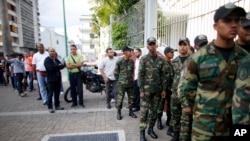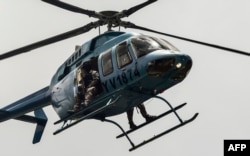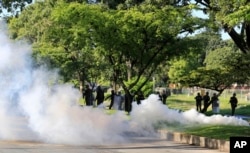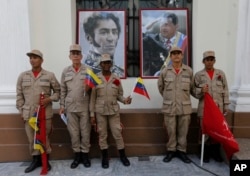As Venezuela's political crisis spins further out of control, many are looking to the military to see if its once-unflinching loyalty to the socialist revolution might be fraying.
On Sunday morning, Venezuelans awoke to news that a small group of armed men tried to take over a major military base in the central city of Valencia after a long-mutinous national guard captain appeared in a video calling for rebellion.
The government said what it described as a "terrorist attack'' led mostly by civilians dressed in fatigues and deserted officers, not active troops, was quickly put down and seven people were arrested. It wasn't clear how much support existed for the so-called "Operation David,'' but dozens of civilians startled by the sound of gunfire poured into the streets singing Venezuela's national anthem to back the rebels.
Many people wonder whether the tension-filled incident could foreshadow a bigger uprising to come from a military with a long history of rebellion and whose troops — like many Venezuelans — are increasingly caught up in the nation's economic and political crisis.
Analysts say that such a scenario is unlikely for now.
While signs of disgruntlement are growing as security forces come under a barrage of rocks and Molotov cocktails during almost-daily anti-Maduro protests, soldiers also fear persecution under an opposition government. In addition, they face risks that any plans for a secret uprising would be found out.
"They feel trapped,'' said former army Gen. Hebert Garcia Plaza, a former Maduro minister. Since seeking exile in Washington in 2015 following accusations of corruption by Maduro, he has emerged as a sought-after filter of information for journalists, the opposition and, increasingly he says, distraught soldiers.
"There's lots of unease, but they can't provoke a political change without a clear horizon of what comes after Maduro,'' Garcia Plaza said.
Venezuela's military accumulated unmatched power and privilege in the past two decades of socialist rule, and Maduro has been increasingly relying on the armed forces as his own grip on power weakens. Last week, with the support of top generals, he plowed forward with a plan to seat an all-powerful assembly mandated with rewriting the constitution. Political opponents and dozens of foreign governments consider it an illegitimate power grab that will strip Venezuela of its last vestiges of democracy.
The opposition is urging the military to switch loyalties and pressure Maduro to cede to its demands, including freeing hundreds of political prisoners and setting a timetable for presidential elections. But many in the military, especially higher-ranking officers, have already hitched their fate to the revolution.
Following a 2002 coup, then-President Hugo Chavez, himself a former tank commander, carried out a deep purge of the military and promoted loyal officers to top positions in the government.
Maduro has expanded the military's political power even further, giving them control of key sectors of the economy, such as food importation. He also rewarded soldiers with pay raises and bonuses that are the envy of civilians struggling amid triple-digit inflation and widespread shortages.
Even before the ballots were counted in the July 30 election for the constitutional assembly, Defense Minister Gen. Vladimir Padrino Lopez went in front of the cameras accompanied by the top military brass to celebrate the results as a defeat for imperialism.
Despite the outward loyalty, some cracks began to appear even before Sunday's attack. At least 106 members of the armed forces, some of them junior officers, have been jailed for alleged crimes such as rebellion and treason since protests began in April, according to the lists provided by an army official on the condition of anonymity for fear of reprisal. There also have been a few high-profile defections from lower-ranked soldiers that have become social media sensations.
One is Giomar Flores, a low-ranking naval intelligence officer who in June released a video calling for the armed forces to uphold the constitution. Before fleeing to Colombia, where the video was recorded, he was assigned to policing food lines in Falcon state, a job that in theory afforded access to hard-to-find staples but which ended up turning him against the institution he loved.
"I decided my future was worth more than a bag of food,'' the 25-year-old Flores said in an interview with The Associated Press from Bogota.
He said the top military command was corrupted by the government and divisions within the institution more apparent than ever.
"The armed forces today are like a snake, whose head is the top command that sadly is subordinated to the regime,'' Flores said. "If you cut off the head, you'll find us the troops.''
Rebellion Faces Obstacles
But a full-grown rebellion such as the one led by then-Lt. Col. Chavez in 1992 faces enormous obstacles, not the least of which is a dedicated counterespionage effort by Maduro.
"It's very hard to create critical mass without being found out,'' said Ivan Briscoe, head Latin American analyst for the International Crisis Group. "In an era of instant digital communications, authorities can be alerted to the risk of destabilization very quickly.''
Far from resolving Venezuela's problems, a coup would trigger a full-blown international crisis and likely split the military, leading to even higher levels of violence approaching a civil war, Briscoe said. Opposition leaders, wary of awakening ghosts in a region that has turned its back on a century of military takeovers, are instead calling for behind-the-scenes pressure and restraint on using force against protesters.
A failure of the socialist system also could expose many senior officers to prosecution for human rights abuses and corruption. Several have already been targeted by U.S. sanctions, including the head of the army and national guard.
The opposition has gone to great lengths to say it will avoid a witch hunt if it gains power. But many in the military are unconvinced that any promises from the traditionally fragmented opposition can be taken seriously, given the huge challenges it would face governing, Garcia Plaza said.
"Many would rather trust the devil they know then the one they don't,'' he said.







